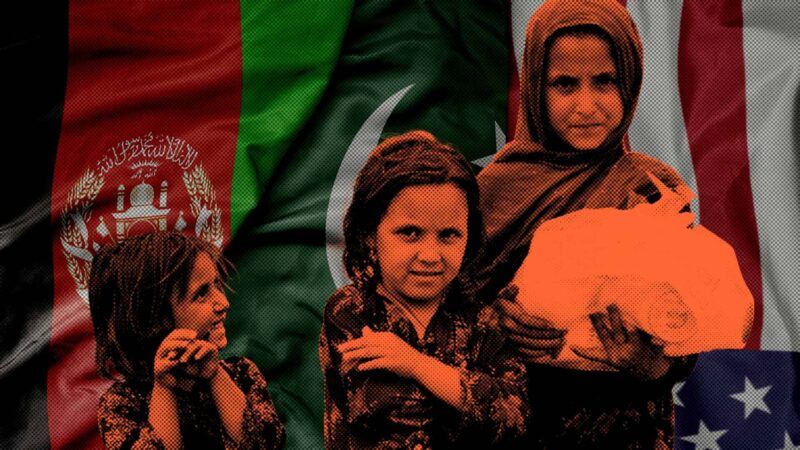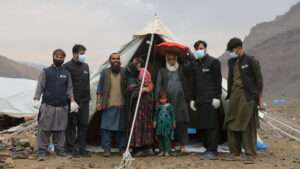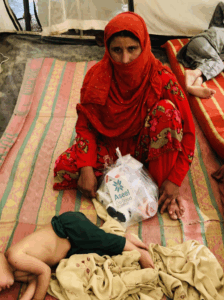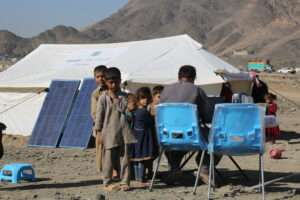Pakistan Deports Afghans Awaiting U.S. Resettlement
Afghans who fled Taliban rule with hopes of U.S. resettlement now face detention, extortion, and forced return.

As one war after another raged in Afghanistan, an estimated 3.5 million Afghans found relative safety living in Pakistan, including about 700,000 who fled across the border following the U.S. withdrawal in August 2021.
In 2023, the Pakistani government announced its intention to deport 3 million Afghans in its Illegal Foreigners Repatriation Plan. More than 800,000 Afghans then returned to their homeland from October 2023 through January 2025.
Deportations got underway in earnest in April of this year, with nearly 110,000 Afghan refugees deported to Afghanistan from April 3 to May 3.
Thus far, the United Nations' International Organization for Migration (IOM) has provided support to about 48,000 Afghan returnees and is urgently requesting funds to "address the needs of between 600,000 and 1.5 million Afghan returnees" in the coming months.
Also in place to provide assistance is the Aseel Foundation. During the tumultuous summer of 2021, Aseel expanded its mission of linking Afghan artisans to the
international marketplace and began crowdfunding aid packages to support Afghans who were displaced, facing food insecurity, or affected by natural disasters.
In April, Aseel began deploying personnel to the returnee area at Torkham to provide

deported Afghans with food packages, clothing, and shelter. It has also begun to register Afghans for omid (the Persian word for "hope") identification cards, which allow holders to receive direct crowdfunded aid.
Blocked Paths to the U.S.
Following the Taliban takeover of Afghanistan and the closure of the U.S. Embassy in Kabul, some U.S. allies with Special Immigrant Visa (SIV) applications and an estimated 20,000 U.S. Refugee Admissions Program (USRAP) applications fled to Pakistan. They weren't just hoping to escape Taliban reprisals: Their cases could be processed only through an active U.S. embassy.
For three and a half years, an agreement between the U.S. and Pakistani governments was meant to offer Afghans security in Pakistan. But refugees in Pakistan cannot work or send their children to school, and they face elevated costs of living, threats of deportation, and extortionate visa costs.
One Afghan told me he had been returned to Afghanistan already, despite his USRAP case.
"I showed the letter which was emailed to us by [the] State Department to exempt us from deportation, but all the Pakistani authorities, including police, was laughing," he said.
I asked the Pakistani Embassy and the Pakistani Ministry of Foreign Affairs how long they assured the U.S. that its allies would remain safe within their borders, whether those Afghans face retribution on return to their homeland, and how many of America's Afghan allies have thus far been returned. I received no answer.
A U.S. State Department spokesperson told me that the "Department does not comment on private diplomatic conversations." The spokesperson added that "all countries must be able to manage their borders and immigration processes in a manner that ensures the safety, security, and prosperity of their citizens."
Legal Breakthroughs and Lingering Uncertainty
With the world deaf to their pleas for assistance, USRAP applicants (speaking under pseudonyms) told me they feel increasingly desperate.
Farid tells me he has been waiting in Pakistan for USRAP processing since September 2021, facing "financial hardship, the constant threat of deportation, [and] lack of access to health care and education." In Pakistan, Farid's wife suffered a miscarriage and has developed severe obsessive-compulsive disorder. While taking her for medical treatment, Farid was detained by police and forced to pay a bribe to be released, exhausting the last of the funds he had made from selling his family's home and his wife's jewelry.
Farid says he feels "utterly hopeless," and explained that a close friend, also a USRAP applicant, recently committed suicide.
Haseena qualified for the USRAP through decades of work with the U.S. government and international NGOs. Her efforts, including helping a 14-year-old who had been forced to marry a senior Taliban member, earned her threats from the Taliban as well as from ISIS and other extremist groups. For her safety, Haseena was transferred to Pakistan a year ago with help from a former employer. The Taliban tortured her brother when they could not locate Haseena.
Haseena's processing was nearly complete, and she had been contacted by IOM about scheduling travel in December before the USRAP suspension. "I cannot even imagine returning because doing so would mean certain death—for me and for my loved ones," Haseena told me.
Nasib spent the last three years waiting for USRAP processing in Pakistan. "We had gone through many problems" before the USRAP suspension, Nasib noted. Now, he added, "the problems have increased." For Nasib, deportation "means death."
It is unclear whether the applicants who shared their stories will benefit from a recent breakthrough in the International Refugee Assistance Project's Pacito v. Trump lawsuit, which was filed in February to challenge the USRAP suspension.
Following U.S. District Judge Jamal Whitehead's February 25 preliminary injunction that forced the U.S. government to continue processing USRAP cases, the government argued it should have to process only 160 USRAP cases.
On May 5, Whitehead issued a compliance order compelling the government to process
Afghans who are set to be processed under the compliance order have not yet received notice, according to Shawn VanDiver, the founder and president of #AfghanEvac, a nonprofit organization supporting Afghans seeking relocation and resettlement. If the government complies with the timeline ordered, then all Afghans set to be processed will receive word of their inclusion by May 19. According to VanDiver, the government is attempting to file an appeal to have the order amended or overturned.




Show Comments (32)